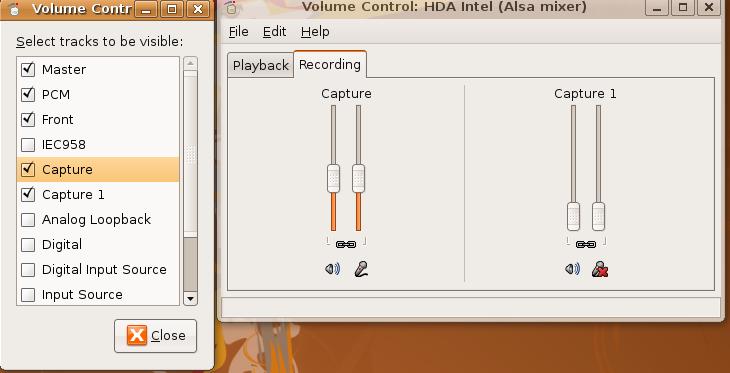As GTalk doesn't support Linux for VoIP communication, I needed some alternative VoIP software, that works well on Ubuntu. There were couple of them Ekiga and Skype.
Ekiga comes pre-installed in Hardy. So I started with Ekiga and registered for a SIP address on ekiga.net. But unfortunately, ekiga failed to communicate with sound hardware on my Dell Vostro 1500 laptop. So I downloaded Skype for Ubuntu. Same story.So I searched the net, and finally got it working. It turned out that the pulseaudio package was the culprit. Skype and Ekiga both don't work with pulseaudio. They work with esound package. So I decided to remove pulseaudio and install esound instead. Before removing pulseaudio, I disabled PusleAudio Session Management from System->Preferences->Sessions.

And then -
killall pulseaudio
sudo apt-get remove pulseaudio
sudo apt-get install esound
On some setups (probably on intrepid), it might be required to remove a file from /etc/X11/Xsession.d so that the Ubuntu login process doesn’t break.
sudo rm /etc/X11/Xsession.d/70pulseaudio
This is not required on Hardy though; there is no such file in Hardy. I think disabling of PulseAudio Session Management, does the trick instead.
After installing esound, and restarting both skype and Ekiga, though I could hear Ringing, and Sound Outs from Skype, the mic was still not working in test call. Then after playing with the system for sometime I realised that the mic was muted. I had to enable mic boost control from Volumn Control->Edit->Preferences and tick Capture and Capture-1.

And then, when I un-muted the mic, skype worked flawlessly. And after skype, Ekiga also started working when I set Audio In and Audio Out devices to HDA Intel.
Interesting Part
Now, here is the interesting part. After playing around with skype and ekiga for a lot of time, I came to know that I had an uninterruptible process (elisa media player) parented by a python zombie process. I rebooted the system, since there is no other effective way to get rid of these zombies, and elisa was consuming 100% of my CPU2 (at least that's what the system monitor reported).
Ubuntu got stuck during reboot, I am not sure for what reason. So I had to power the system off. When I powered it back up again, I could login and there were no error messages related to pulseaudio. But the UI was totally unresponsive, as if it has hanged. iThen I switched back to command line mode using CTRL-ALT-F5, logged in, removed esound and reinstalled pulseaudio.
sudo apt-get remove esound
sudo apt-get install pulseaudio
sudo rebootAnd after reboot, the UI was back to life again. So it was the pulseaudio which caused this freeze. Out of curiosity, I started Skype and made a test call. And to my surprise, both mic and audio playback worked!!! Now this was not expected, as skype initially refused to work with pulseaudio. So did ekiga.
I started the PulseAudio Session Management as well, still Skype and Ekiga worked perfectly.
ConclusionIt seems that, on Hardy, Skype and Ekiga, both work with pulseaudio, and it was probably due to the zombie process of elisa media player hogging the sound device that caused problems with audio playback and mi, in Skype/Ekiga.
So finally, it seems that, on Ubuntu 8.04 Hardy Heron, you don't need to remove anything or install anything, to get Skype and Ekiga working!!! And this whole post of mine turns out to be a pure waste of time and energy!!!! :(
An Update -
Just in case somebody is interested, there is a very informative post about pulseaudio and how to get it working, on ubuntuforums.org -
HOWTO: PulseAudio Fixes & System-wide Equalizer SupportTechnorati Tags:
ubuntu,
hardy,
linux,
skype,
ekiga,
voip






